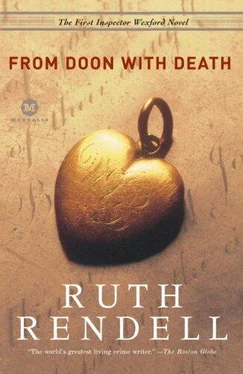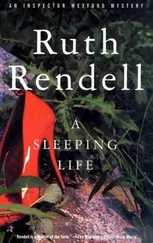‘I’m sure you remember’ he said conversationally, ‘how close it got on Tuesday afternoon. It must have been very warm in the car. Doon and Minna had had their lunch, a much bigger lunch than Minna would have had here… She was bored and she fell asleep.’ His voice rose but not in anger. ‘I don’t say she deserved to die then, but she asked for death!’
Fabia Quadrant shook off her husband’s hand and came towards Wexford. She moved with dignity to the only one who had ever understood. Her husband had protected her. Burden thought, her friends had recoiled, the one she loved had only been bored. Neither laughing nor flinching, a country policeman had understood.
‘She did deserve to die! She did!’ She took hold of the lapels of Wexford’s coat and stroked the stuff. ‘I loved her so. May I tell you about it because you understand? You see, I had only my letters.’ Her face was pensive now, her voice soft and unsteady. ‘No books to write.’ She shook her head slowly, a child rejecting a hard lesson. ‘No poems. But Douglas let me write my letters, didn’t you, Douglas? He was so frightened…’ Emotion came bubbling up, flooding across her face till her cheeks burned, and the heat from the window bathed her.
There was nothing to be frightened of!’ The words were notes in a crescendo, the last a scream. ‘If only they’d let me love her … love her, love her…’
She took her hands away and tore them through the crest of hair. ‘Love her, love her.. ‘
‘Oh God!’ Quadrant said, crouching on the trunk. ‘Oh God!’
‘Love her, love her … green pleasure or grey grief…’ She fell against Wexford and gasped into his shoulder. He put his arm around her hard, forgetting the rules, and closed the window.
Still holding her, he said to Burden: ‘You can take Mrs Missal away now. See she gets home all right.’
Helen Missal drooped, a battered flower. She kept her eyes down and Burden edged her through the door, out on to the landing and down the hot dark stair. Now was not the time, but he knew Wexford must soon begin:
‘Fabia Quadrant, I must tell you that you are not obliged to say anything in answer to the charge but that anything you do say…’
The love story was ended and the last verse of the poem recited.
The truth is great and shall prevail.
Coventry Patmore, Magna est Veritas
Doon had written precisely a hundred and thirty-four letters to Minna. Not one had ever been sent or even left the Quadrants’ library where, in the drawer of a writing-desk, Wexford found them that Sunday afternoon. They were wrapped in a pink scarf and beside them was a brown purse with a gilt clip. He had stood on this very spot the night before, all unknowing, his hand within inches of the scarf, the purse and these wild letters.
Scanning them quickly. Burden understood now why Doon had printed the inscriptions in Minna’s books. The handwriting daunted him. It was spidery and difficult to decipher.
‘Better take them away, I suppose,’ he said. ‘Are we going to have to read them all, sir?’
Wexford had looked more closely, sifting the significant from the more obviously insane.
‘Only the first one and the last two, I fancy,’ he said. ‘Poor Quadrant. What a hell of a life! We’ll take all this lot down to the office, Mike. I’ve got an uneasy feeling Nanny’s listening outside the door.’
Outside, the heat and the bright light had robbed the house of character. It was like a steel engraving. Who would buy it, knowing what it had sheltered? It could become a school. Burden supposed, or an hotel or an old people’s home. The aged might not care, chatting, reminiscing, watching television in the room where Fabia Quadrant had written to the woman she killed.
They crossed the lawn to their car.
‘ “Green pleasure and grey grief”,’ Wexford said. ‘That just about sums this place up.’
He got into the passenger seat and they drove away.
At the police station they were all talking about it, loitering in the foyer. It was an excitement that had come just at the right moment, just when they were growing tired of remarking on the heat-wave. A murderer and a woman at that… In Brighton it was one thing. Burden thought, but here! For Sergeant Camb it was making Sunday duty bearable; for green young Gates, who had almost decided to resign, it had tipped the scales in favour of his staying.
As Wexford came in, setting the doors swinging and creating a breeze out of the sultry air, they dispersed. It was as if each had suddenly been summoned to urgent business.
‘Feeling the heat?’ Wexford snapped. He banged into his office.
The windows had all been left open but not a paper on the desk had stirred.
‘Blinds, Mike. Pull down the blinds!’ Wexford threw his jacket on to a chair. ‘Who in hell left the windows open? It upsets the air conditioning.’
Burden shrugged and pulled down the yellow slats. He could see that the gossip he hated had shaken Wexford into impatient rage. Tomorrow the whole town would seethe with speculation, with wisdom after the event Somehow in the morning they were going to have to get her into the special court… But it was his day off. He brightened as he thought that he would take Jean to the sea.
Wexford had sat down and put the letters, thick as the manuscript of a long novel or an autobiography, Doon’s autobiography, on the desk. It was shady in the office now, thin strips of light seeping through the blinds.
‘Do you think he knew about it when he married her?’ Burden asked. He began to sort through the letters, picking here and there on a legible phrase. He read in a kind of embarrassed wonder, “Truly you have broken my heart and dashed the wine cup against the wall…”’
Cooler now in temperature and temper, Wexford swivelled round in his purple chair.
‘God knows’ he said. ‘I reckon he always thought he was God’s gift to women and marrying him would make her forget all about Minna’ He stabbed at one of the letters with his forefinger. ‘I doubt whether the marriage was ever consummated.’ Burden looked a little sick, but Wexford went on.
“‘Even to that other dweller in my gates my flesh has been as an unlit candle…”’ He looked at Burden. ‘Et cetera, et cetera. All right, Mike, it is a bit repulsive.’ If it had been less hot he would have brought his fist down on the desk. Fiercely he added, ‘They’re going to gobble it up at the Assizes.’
‘It must have been terrible for Quadrant’ Burden said. ‘Hence Mrs Missal and Co.’
‘I was wrong about her. Mrs Missal, I mean. She was really gone on Quadrant, mad for him. When she realized who Mrs P. was and remembered what had happened at school, she thought Quadrant had killed her. Then, of course, she connected it with his behaviour in the wood. Can’t you see her, Mike?.. ‘ Wexford was intent yet far away. ‘Can’t you imagine her thinking fast when I told her who Mrs P. was? She’d have remembered how Quadrant insisted on going to that lane, how he left her in the car and when he was gone a long time she followed him, saw the match flame under the bushes, called to him perhaps. I bet he was as white as a sheet when he got back to her.
‘Then I talked to her yesterday and I caught her unawares. For a split second she was going to tell me about Fabia, about all her ambitions going to pot. She would have told me, too, only Missal came in. She telephoned Quadrant, then, in the five minutes it took me to get to his house and she went out to meet him. I asked her if she was going to the cinema! He didn’t turn up. Coping with Fabia, probably. She phoned him again in the evening and told him she knew Fabia was Doon, knew she had had a schoolgirl crush on Mrs P. Then he must have said he wanted to get into Parsons’ house and get hold of the books, just in case we’d overlooked them. Remember, he’d never seen them - he didn’t know what was in them. Mrs Missal had seen the church notice-board. It's just by her house. She told Quadrant Parsons would be out…’
Читать дальше











